|
|
|
Sort Order |
|
|
|
Items / Page
|
|
|
|
|
|
|
| Srl | Item |
| 1 |
ID:
152355
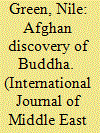

|
|
|
|
|
| Summary/Abstract |
Through their interactions with French archaeologists from around 1930, Afghan historians formulated a new official historical identity for Afghanistan based on its pre-Islamic past. This article provides the first analysis of this process by tracing the emergence of the new historiography through the career of its chief promoter, Ahmad ʿAli Kuhzad, as curator of the National Museum (founded 1931) and director of the Afghan Historical Society (founded 1942). Through placing Kuhzad in these official institutional settings and reading his major works, the article shows how traditional Persianate historiography was challenged by an imported and amended version of world civilizational history. In the decades after independence in 1919, this new historical vision allowed the young Afghan nation-state to stake its civilizational claims on an international stage. In these previously unexcavated historiographical strata lie the roots of the Taliban's iconoclasm, which are revealed as a dialogical response to the state cultural institutions that remade Afghanistan as Aryana.
|
|
|
|
|
|
|
|
|
|
|
|
|
|
|
|
| 2 |
ID:
155790
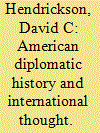

|
|
|
|
|
| Summary/Abstract |
This essay offers a constitutional perspective on the American encounter with the problem of international order. Its point of departure is the American Founding, a subject often invisible in both the history of international thought and contemporary International Relations theory. Although usually considered as an incident within the domestic politics of the United States, the Founding displays many key ideas that have subsequently played a vital role in both international political thought and IR theory. The purpose of this essay is to explore these ideas and to take account of their passage through time, up to and including the present day. Those ideas shine a light not only on how we organize our scholarly enterprises but also on the contemporary direction of US foreign policy and the larger question of world order.
|
|
|
|
|
|
|
|
|
|
|
|
|
|
|
|
| 3 |
ID:
185831
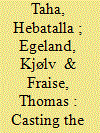

|
|
|
|
|
| Summary/Abstract |
Looming decisions on arms control and strategic weapon procurements in a range of nuclear-armed states are set to shape the international security environment for decades to come. In this context, it is crucial to understand the concepts, theories, and debates that condition nuclear policymaking. This review essay dissects the four editions of The Evolution of Nuclear Strategy, the authoritative intellectual history of its subject. Using this widely acclaimed work as a looking glass into the broader field of nuclear security studies, we interrogate the field's underlying assumptions and question the correspondence between theory and practice in the realm of nuclear policy. The study of nuclear strategy, we maintain, remains largely committed to an interpretive approach that invites analysts to search for universal axioms and to abstract strategic arguments from the precise circumstances of their occurrence. While this approach is useful for analysing the locutionary dimension of strategic debates, it risks obscuring the power structures, vested interests, and illocutionary forces shaping nuclear discourse. In the conclusion, we lay out avenues for future scholarship.
|
|
|
|
|
|
|
|
|
|
|
|
|
|
|
|
| 4 |
ID:
191064
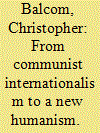

|
|
|
|
|
| Summary/Abstract |
This paper investigates the thought of the Indian revolutionary and philosopher M.N. Roy (1887–1954). The essay argues that Roy’s pivot from Marxism to a liberal ‘New Humanism’ over the course of the 1930s and 1940s was shaped by his thinking about fascism and represents a broader turn away from a materialist reading of history and loss of confidence in the Indian working class. The paper begins with an analysis of Roy’s early communism, and considers his later critique, elaborated from the 1930s onwards, that ‘Gandhism’ represented an Indian form of fascism, and explores how these arguments led to his rejection of Marxism.
|
|
|
|
|
|
|
|
|
|
|
|
|
|
|
|
| 5 |
ID:
163819
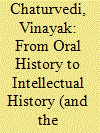

|
|
|
|
|
| Summary/Abstract |
This paper provides an interpretation of the Bengali Intellectuals Oral History Project as a new archive for studying the intellectual history of South Asia. It explains that an important outcome of the nexus between oral history and intellectual history is the construction of an ‘unintended autobiography’ of each subject interviewed in the project. By considering the centrality of autobiography, the paper offers insights into rethinking the methodological approaches to writing the intellectual history of South Asia. Finally, it provides a reading of Partha Chatterjee’s seminal writings, along with his oral history, as a way to consider the convergence of autobiography with political thought.
|
|
|
|
|
|
|
|
|
|
|
|
|
|
|
|
| 6 |
ID:
155786
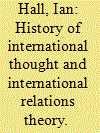

|
|
|
|
|
| Summary/Abstract |
Over the past two decades, historians of international thought have markedly improved our understanding of the disciplinary history of International Relations (IR) and its wider intellectual history. During that period, ‘contextualism’ has become a leading approach in the field, as it has been for half a century in the history of political thought. This article argues that while the application of contextualism in IR has improved our understanding of its disciplinary history, its assumptions about the proper relationship between historians and theorists threaten to marginalise the history of international thought within IR. It argues that unless the inherent weaknesses in contextualism are recognised, the progress made in the field will go unrecognised by a discipline that sees little reason to engage with its history. It suggests that historians of international thought adopt an extensively modified version of contextualism that would allow them to rebuild bridges back into IR, especially IR theory.
|
|
|
|
|
|
|
|
|
|
|
|
|
|
|
|
| 7 |
ID:
157515
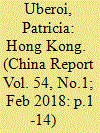

|
|
|
| 8 |
ID:
084900
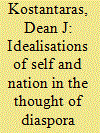

|
|
|
|
|
| Publication |
2008.
|
| Summary/Abstract |
Diaspora intellectuals have often played prominent roles in the formation of national revival and independence movements. This article explores the factors that may help to explain this phenomenon through a survey of the literary responses of intellectuals from Eastern Europe, colonial Africa and Asia to their experiences in the capital cities of Western Europe over the early modern and modern era. These reactions, expressed through the writings of influential figures such as Adamantios Koraes and Leopold Senghor, reveal, in their thematic convergence, aspects of such encounters that have remained consistent over time. Portrayed throughout are the emotional hardships of talented individuals who found their status suddenly conditioned by the ideas associated with their places of origin in the host society's imagination. Unwilling, for reasons explored below, to submit passively to these affronts, the individuals studied here threw their energies instead into ambitious projects of national re-imagination and rehabilitation. The article makes use, finally, of the rather visceral quality of the literature surrounding the experience of diaspora intellectuals to account for the complex weave of modern and traditional elements often exhibited in the new idealisations of self and nation that appear throughout their works.
|
|
|
|
|
|
|
|
|
|
|
|
|
|
|
|
| 9 |
ID:
164039
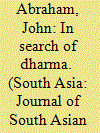

|
|
|
|
|
| Summary/Abstract |
This article examines the roots of a Hindu nationalist economic agenda. Beginning with a critical overview of Deendayal Upadhyaya’s economic manifesto, Integral Humanism (1965), it delineates the eclectic set of ideas drawn together by this early Hindu nationalist leader to formulate an alternative ethical and economic agenda from either centralised planning or its liberal critics. The paper then gauges the influence of Integral Humanism on two successive Hindu nationalist political parties. The analysis shows more discernable influence on the economic position of the Bharatiya Jana Sangh (1951–77) than on its successor, the Bharatiya Janata Party (from 1980). The conclusion offers some observations as to why this is the case, and outlines prospects for the economic future of India under a Hindu nationalist government.
|
|
|
|
|
|
|
|
|
|
|
|
|
|
|
|
| 10 |
ID:
163820
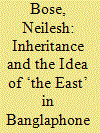

|
|
|
|
|
| Summary/Abstract |
Recent research on intellectual histories of the Global South explore the nature of inheritance and the incorporation of ideas from diverse places into colonial and post-colonial histories. Though research into the histories of science, liberalism and nationalism have multifaceted reference points in the discipline of history, histories of intellectuals in conversation with the history of decolonisation remain a missing link in the history of the twentieth century. Through engagement with the ‘Bengali Intellectuals Oral History Project’ (BIOHP), this paper argues that intellectuals from West Bengal, India, maintained a complex vector of inheritance with Western social thought when contrasted with their East Bengali/Pakistani/Bangladeshi counterparts. The primary interlocutors of eastern Bengali intellectuals were not ‘the West’, but were western Bengal, inside a regional, as opposed to an increasingly global, audience and marketplace of Indian intellectuals.
|
|
|
|
|
|
|
|
|
|
|
|
|
|
|
|
| 11 |
ID:
137520
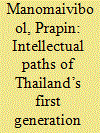

|
|
|
|
|
| Summary/Abstract |
This article studies the oral history interviews of two China scholars in Thailand by drawing upon each scholar’s encountering and choices. The focal points of the interviews are placed on their professional as well as social and on their local as well as international encountering with Chinese that shaped their choices and consequently their different intellectual paths and contribution to the knowledge and understanding of China in Thailand. The analysis compares and contrasts the factors similar and different to the first generation China scholars in Thailand.
|
|
|
|
|
|
|
|
|
|
|
|
|
|
|
|
| 12 |
ID:
155791
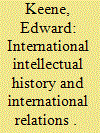

|
|
|
|
|
| Summary/Abstract |
This article reviews contextualist methods in intellectual history and discusses some of the specific challenges involved in their application to the study of International Relations (IR) and hence international intellectual history. While the broad thrust of these developments has been highly positive, the article argues that a distinction between classic and lesser works is a crucial part of the apparatus of the contextualist approach, which poses a problem in IR, where the idea of an established canon of great works has historically been less well developed than in the study of Political Theory or Law. As a result, the move towards contextualist methods of interpretation can force authors to restrict their focus onto a newly conceived, and somewhat narrow, canon, with a strongly political and legal flavour. The eclectic range of earlier, albeit less methodologically sophisticated, histories offer considerable resources for defining the scope of new empirical enquiries in international intellectual history, and the article concentrates on early modern journalism as an example of this opportunity.
|
|
|
|
|
|
|
|
|
|
|
|
|
|
|
|
| 13 |
ID:
155784
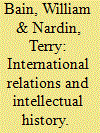

|
|
|
|
|
| Summary/Abstract |
The history of international thought has traditionally focused on a limited number of canonical texts. Such an approach now seems both naive and parochial. International Relations scholars often read their own ideas into these texts instead of getting ideas from them – ideas that if properly understood have the potential to undermine theirs. By ignoring non-canonical texts, we overlook resources that are not only necessary to establish the historical contexts of canonical writings but that can also help theorists of International Relations to understand their subject better. Judgements of what is and is not canonical are in any case themselves context-bound and contestable. Intellectual history can help us understand how the International Relations canon was constructed and for what purposes. It can also counter the abstractions of theory by reminding us not only that theories are abstractions from the activities of people living in particular times and places but also that our own theories are embedded in historicity. In these and other ways, paying attention to intellectual history expands the repertoire of ideas on which International Relations theorists can draw and against which they can measure their conclusions. The articles in this issue illustrate these points in relation to a wide range of texts and contexts. They suggest that whether one approaches international relations from the angle of description, explanation, policy or ethics, knowing how past thinkers have understood the subject can lead to better informed and more robust scholarship.
|
|
|
|
|
|
|
|
|
|
|
|
|
|
|
|
| 14 |
ID:
178335
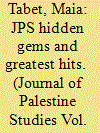

|
|
|
|
|
| Summary/Abstract |
In 1971, the Journal of Palestine Studies (JPS) came into being. Published by the Beirut-based Institute for Palestine Studies, it soon became the organization’s flagship English-language publication, a forum for the study of Palestine and the Palestinians, as well as a repository of documentation on Palestinian life, both past and present. Over the half century that has since elapsed, JPS has been a driver of knowledge production on the Palestinian condition and a crucible of learning.
|
|
|
|
|
|
|
|
|
|
|
|
|
|
|
|
| 15 |
ID:
178336
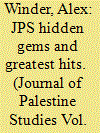

|
|
|
|
|
| Summary/Abstract |
Perusing JPS’s fifty years of documenting Palestinian history, this essay reminds us that history is both “what happened” as well as “the narration of what happened.” Anchoring his selection in that perspective, Alex Winder identifies Charles Anderson’s “State Formation from Below and the Great Revolt in Palestine” (2017) as a JPS “hidden gem,” and Tarif Khalidi’s “Palestinian Historiography: 1900–1948” (1981) as a “greatest hit.” Relying on primary sources by participants in the rebellion and highlighting the history of the revolt, Anderson shifts the focus of traditional accounts of the revolt from the mostly ineffective role of Palestinian notables and elites to the successes of the rebels. In a similar vein, Khalidi’s article paints a picture of a rich and vibrant Palestinian intellectual life in the first half of the twentieth century that reverses the conventional view of the colonized as reactive and of the colonizer as the primary agent of history.
|
|
|
|
|
|
|
|
|
|
|
|
|
|
|
|
| 16 |
ID:
155792
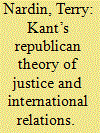

|
|
|
|
|
| Summary/Abstract |
Kant’s primary concern in writing on international relations is how to achieve ‘justice’ (Recht) between states. This means that instead of reading Kant as a theorist of peace or world government, as IR theorists have usually done, he is better read as a theorist international justice. His view of justice, which identifies it with a legal order that respects freedom as independence or nondomination, is broadly republican. But he equivocates on the possibility of justice at the international level, and this narrows what is usually seen as a wide gap between Kant’s thought and political realism. The paradox his uncertainty reveals is that it is wrong for states to remain in a lawless condition yet impossible for them to escape it so long as they remain independent. An international order cannot generate genuine law because there are no institutions to make, interpret, or enforce it. This means that states are entitled to determine their own foreign affairs. The gap between sovereignty and justice cannot be closed so long as these ideas are defined as they are within the state. The problem is not that a full, secure, and nonvoluntary system of justice that preserves the sovereignty of states is contingently unlikely. It is conceptually impossible. This conclusion poses a challenge to current theories of global justice.
|
|
|
|
|
|
|
|
|
|
|
|
|
|
|
|
| 17 |
ID:
179285
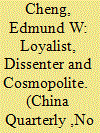

|
|
|
|
|
| Summary/Abstract |
This paper surveys the process of discursive contestation by intellectual agents in Hong Kong that fostered a counter-public sphere in China's offshore. In the post-war era, Chinese exiled intellectuals leveraged the colony's geopolitical ambiguity and created a displaced community of loyalists/dissenters that supported independent publishing venues and engaged in the cultural front. By the 1970s, homegrown and left-wing intellectuals had constructed a hybrid identity to articulate their physical proximity to, yet social distance from, the Chinese nation-state, as well as to appropriate their sense of belonging to the city-state, through confronting social injustice. In examining periodicals and interviewing public intellectuals, I propose that this counter-public sphere was defined first by its alternative voice, which contested various official discourses, second by its multifaceted inclusiveness, which accommodated diverse worldviews and subjectivities, and third by its critical platform, which nurtured social activism in undemocratic Chinese societies. I differentiate the permissive conditions that loosened constraints on intellectual agencies from the productive conditions that account for their penetration and diffusion. Habermas's idealized public sphere framework is revisited by bringing in ideational contestation, social configuration and cultural identity.
|
|
|
|
|
|
|
|
|
|
|
|
|
|
|
|
| 18 |
ID:
182840
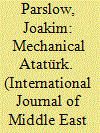

|
|
|
|
|
| Summary/Abstract |
Turkey's 1960 military coup d’état was received by Kemalists in the courts, bureaucracy, and universities as an opportunity to reinvigorate Atatürk's ideal of a centralized and rationally organized state. This article investigates how a handful of avant-garde thinkers sought to ride the post-1960 wave of reformism by promoting a techno-utopian approach to governance through publications and seminars aimed at state leaders and intellectuals. Cybernetics, they argued, offered a paradigm of adjudication and administration unblemished by association with the ascendant ideologies of the Cold War, whether socialist or conservative, and was fully in keeping with Kemalism. I argue that, although it remained largely at the stage of fantasy, Turkish cybernetics ultimately served as a set of metaphors with which conservative state thinkers from different political camps found common ground, facilitating the shift that occurred within the state during the 1970s away from the rights-based pluralism of the Constitution of 1961 and toward an effort to de-radicalize Turkish society, if necessary through violence.
|
|
|
|
|
|
|
|
|
|
|
|
|
|
|
|
| 19 |
ID:
157870
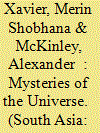

|
|
|
|
|
| Summary/Abstract |
This article analyses M.C. Siddi Lebbe's (d. 1898) Sufi treatise, Asrarul Alam (Mysteries of the Universe), with attention to the literary networks operating among late nineteenth-century South Asian Muslims. The diversity of Lebbe's source material and complexity of his argumentation signal his broad engagement with Islamic thought old and new, foreign and local, Arabic and Tamil. Furthermore, Lebbe cast his literary network especially wide, incorporating non-Islamic ideas like theosophy and yoga from Euro-American and Indic sources as foils for the explication of Sufism. This philosophical mosaic in turn sparked debate among Muslim scholars. Asrarul Alam became an impetus for identity definition in a controversy that involved high stakes in translation choices and the unique complexities of works by a trilingual author such as Lebbe.
|
|
|
|
|
|
|
|
|
|
|
|
|
|
|
|
| 20 |
ID:
097804
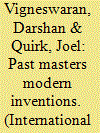

|
|
|
|
|
| Publication |
2010.
|
| Summary/Abstract |
In this article, we explore the relationship between past and present international relations (IR) scholarship, paying particular attention to the way in which various representations, interpretations and classifications of past works can collectively influence how modern scholars ask and answer questions. This serves two main purposes. On the one hand, we seek to contribute to a growing literature interrogating misleading and simplistic depictions of past authors and eras. On the other, we explore how the history of ideas can be utilized as a critical resource, which offers a compelling platform from which to refine and re-evaluate prevailing notions of the purposes of intellectual inquiry.
|
|
|
|
|
|
|
|
|
|
|
|
|
|
|
|
|
|
|
|
|